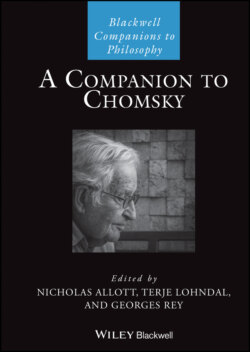Читать книгу A Companion to Chomsky - Группа авторов - Страница 64
6.2 Internalism in Phonology
ОглавлениеOur simple example from Québec French allows us to discuss one of the most important notions of SPE phonology, and Chomsky's linguistics more generally: radical internalism. The input representations referred to above consist of morphemes, minimal data structures containing (at least) semantic and phonological information. Under the internalist perspective, these morphemes are encoded as (or, just are) information in the minds/brains of speakers. They are not in books, in the air, or anywhere out in the world as properties of speech communities. When we informally refer to speakers of ‘Québec French’ or ‘English’ we assume an idealized population that is identical in all ways relevant to the phenomenon under discussion, say having type‐identical vowels in type‐identical morphemes in their lexicon.1 So, the internalism that is standard in other aspects of Chomsky's linguistics, and is in fact the most profound consequence of the cognitive revolution of the 1950s and 1960s, is equally relevant to Chomsky's phonology.
According to the discussion on p. 3 of SPE, language is taken to be a system of knowledge that is fully internal to the human mind: “The person who has acquired knowledge of language has internalized a system of rules that determines sound‐meaning connections for indefinitely many sentences.” This “for the most part, obviously, unconscious knowledge,” which is “realized physically in a finite human brain”, is referred to as “the speaker‐hearer's competence,” and it should be strictly distinguished from “performance,” that is, from “what the speaker‐hearer actually does” with this knowledge on a particular occasion. The general goal of linguistics “is the construction of a grammar,” where grammar refers to “the explicit theory constructed by the linguist and proposed as a description of the speaker's competence.” Of course, competence cannot be observed directly. Its properties can only be discovered indirectly, for example by inferring them on the basis of evidence provided by performance. Since performance “is a complex matter that involves many factors,” this main body of empirical data from which phonological conclusions can be drawn will necessarily include a welter of accidental and irrelevant information. A universal phonological theory provides a principled basis for distinguishing between relevant and irrelevant aspects of empirical data, as in all sciences.
Consistent with this internalism, we see that, just as in syntax, Chomsky's phonology, as presented in SPE itself and many of the papers leading up to the book (Chomsky 1951, 1957b,a, 1964b; Chomsky et al. 1956; Halle 1959, 1962, 1964; Chomsky and Halle 1965), considers the actual object of study to be the cognitive system (phonological competence) that underlies observable behavior (speech production and perception). Observable behavior is just one source of evidence for competence.
Despite the clarity and coherence of SPE's radical cognitivism, much subsequent work in phonology has ignored or rejected internalism to varying degrees. As we'll see, much of the literature fails to engage with the philosophical foundations of the cognitive revolution, and has been preoccupied with describing verbal behavior, rather than the underlying knowledge that makes that behavior possible. These preoccupations have maintained or even gained in popularity from the time of the publication of SPE up until the present, as witnessed by the prominence of “output‐driven” models of phonology (e.g., Tesar 2014) and by the prevalent orientation toward “the surface” throughout the field.
Of course, most scholars accept that some aspects of language are “in the mind,” but the Chomskyan perspective is that language, phonology included, is all in the mind. Linguistic mental representations are the constituents of language, and are not understood as “representing” mind‐external entities. For example, Chomsky (2009a, p. 27) proposes that for surface phonological (phonetic) entities “such as the syllable /ba/; every particular act externalizing this mental entity yields a mind‐independent entity, but it is idle to seek a mind‐independent construct that corresponds to the syllable.” This perspective, not only for phonology, but also for syntax and semantics, is endorsed by many scholars, including Jackendoff (1992), who says “Language, as far as I can tell, is all construction,” meaning “all internal construction.”
Aside from internalism, naturalism and nativism are the most important notions of Chomsky's legacy in linguistics. These notions don't just apply to phonology as to syntax; rather it is also the case that Chomsky's consistent and radical versions of these notions can even be justified with phonological examples. As phonologists, we regret that the phonological arguments are not as well known as the syntactic ones. For the purposes of this brief discussion, we focus on the relationship between internalism and nativism.
